Physical Address
304 North Cardinal St.
Dorchester Center, MA 02124
Physical Address
304 North Cardinal St.
Dorchester Center, MA 02124
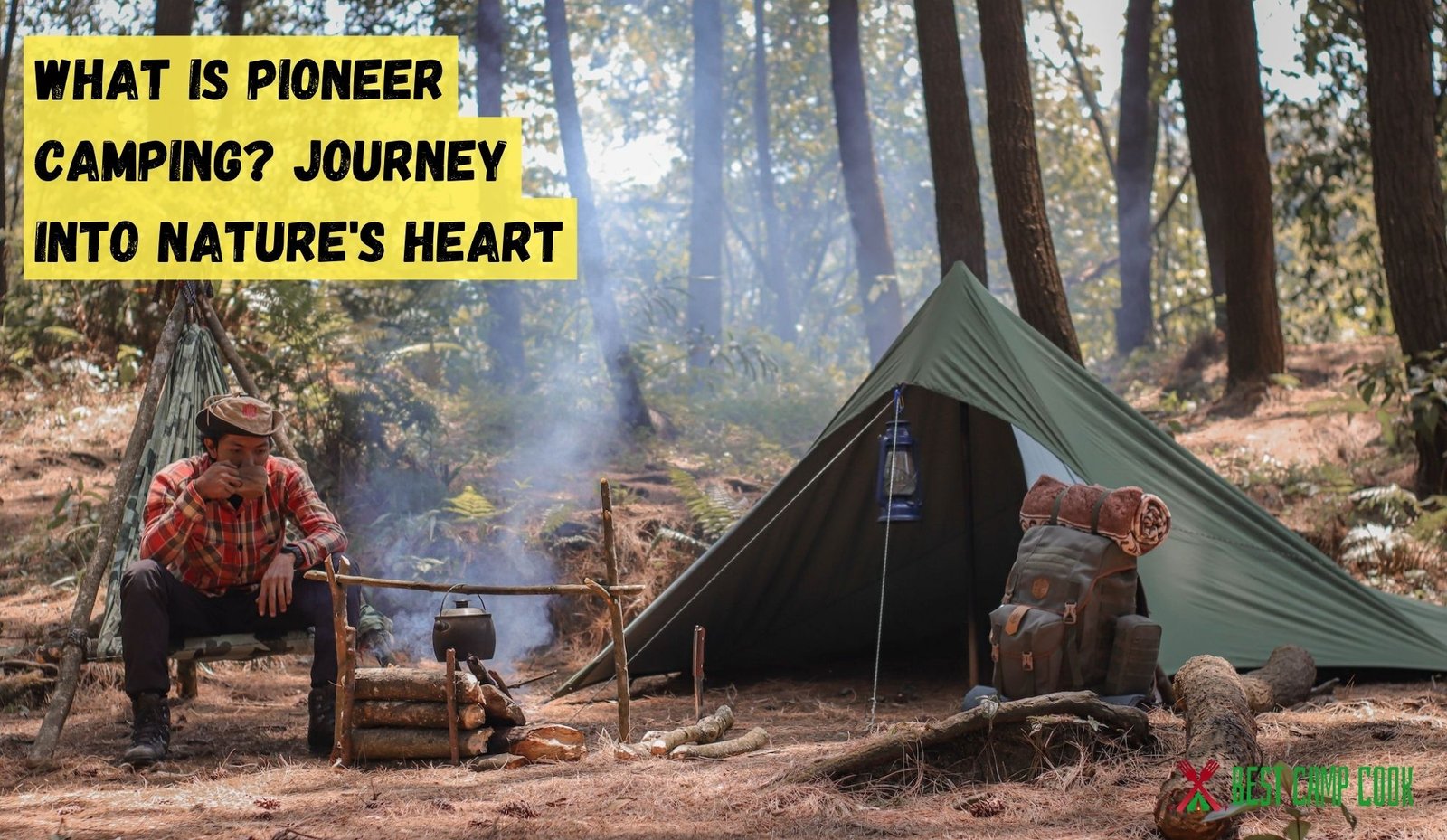
Curious about what is pioneer camping? If you’re eager to discover the wonders of outdoor exploration and self-sufficiency, then you’re in for an exciting journey.
Pioneer camping offers a unique and immersive experience, allowing you to disconnect from the modern world and reconnect with nature in a profound way. It’s more than just a traditional camping trip—it’s a chance to test your limits, embrace simplicity, and ignite your spirit of adventure.
In this concise guide, we’ll unveil the essence of pioneer camping, unravel its rich history, and provide you with the essential insights to embark on your own unforgettable expedition. So, get ready to trade the comforts of civilization for the untamed wilderness as we delve into the captivating world of pioneer camping!
Main Summary: What is Pioneer Camping?
Pioneer camping is a back-to-basics outdoor experience where campers rely on primitive methods and minimal gear. Campers use basic gear like canvas tents, cast-iron cookware, and traditional tools. It involves self-sufficiency, survival skills, and a connection with nature.
Pioneer camping, also known as primitive camping or bushcraft camping, is a style of camping that embraces the simplicity and self-reliance of early settlers and explorers. It involves venturing into the wilderness with minimal equipment and relying on essential survival skills to thrive in the natural environment.
Unlike traditional camping, which often involves established campgrounds and modern amenities, pioneer camping encourages individuals to reconnect with nature and adopt a resourceful approach to outdoor living.
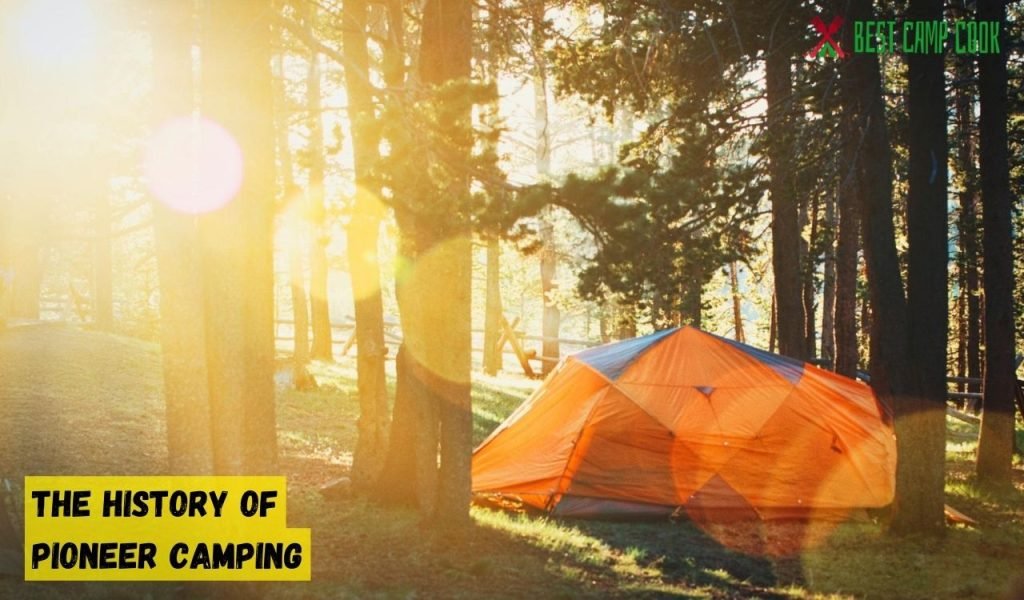
The roots of pioneer camping can be traced back to ancient civilizations and early explorers who ventured into uncharted territories. Throughout history, humans have been drawn to the allure of the outdoors and the desire to explore and conquer new frontiers. Here are some key points highlighting the history of pioneer camping:
Nomadic tribes and early settlers were among the first to engage in pioneer camping. These groups relied on camping as a means of survival while moving from one place to another in search of food, water, and resources. They developed portable shelters, such as tents and teepees, and honed their survival skills to adapt to various landscapes and climates.
The Age of Exploration in the 15th and 16th centuries marked a significant period for pioneer camping. Explorers like Christopher Columbus, Vasco da Gama, and Captain James Cook set sail on daring expeditions to discover new lands and establish trade routes. These explorers and their crews engaged in camping along their journeys, setting up temporary campsites as they explored unfamiliar territories.
In the 18th and 19th centuries, pioneer camping played a vital role in the frontier expansion and westward movement in regions like North America. Pioneers and settlers embarked on arduous journeys, often traveling long distances in covered wagons, and relied on camping as they made their way to new territories. They established campsites along the trails, building temporary shelters and relying on the resources available in the wilderness.
The development of recreational camping as we know it today can be attributed to the late 19th and early 20th centuries. This period saw a shift from camping solely for survival or exploration purposes to camping for leisure and recreation. Outdoor enthusiasts, inspired by nature conservation movements and a desire to escape urban life, began to embrace camping as a recreational activity.
The early 20th century witnessed the rise of the camping movement, which aimed to promote camping as a means of physical, mental, and spiritual rejuvenation. Organizations like the Boy Scouts of America and the Girl Guides played a crucial role in popularizing camping among youth and instilling values of self-reliance, teamwork, and appreciation for the natural world.
As camping gained popularity, advancements in camping equipment and infrastructure emerged. Innovations such as lightweight tents, portable cooking stoves, and durable camping gear made camping more accessible and comfortable for individuals and families. Campgrounds, national parks, and recreational areas were developed to accommodate campers and provide necessary amenities.
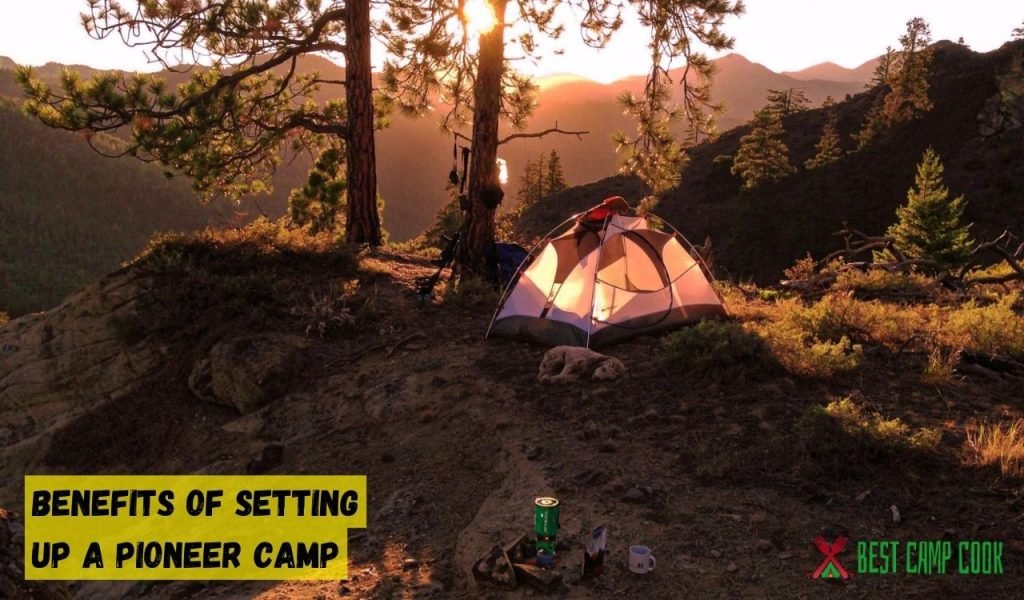
Pioneer camping offers a profound connection with the natural environment. By immersing oneself in the wilderness, campers can appreciate the beauty of untouched landscapes, observe wildlife in its natural habitat, and experience a sense of tranquility that modern living often lacks.
Engaging in pioneer camping cultivates self-reliance and essential survival skills. Campers learn to adapt to changing conditions, build shelters from natural materials, start fires without matches, purify water, and forage for edible plants. These skills not only enhance one’s ability to thrive in the wilderness but also foster confidence and self-assurance in challenging situations.
Pioneer camping encourages a minimalist approach to outdoor living. With limited equipment and supplies, campers prioritize essential items, shedding the excesses of modern life. This promotes a greater appreciation for the simplicity and basic necessities of survival.
The physical demands of pioneer camping, such as hiking, gathering firewood, and setting up camp, provide opportunities for exercise and promote overall fitness. Additionally, spending time in nature has been linked to reduced stress levels, improved mood, and enhanced mental well-being.
Pioneer camping fosters a deep appreciation for the environment and encourages sustainable practices. Campers learn to minimize their impact on natural resources, leave no trace behind, and develop a sense of responsibility towards preserving the wilderness for future generations.
Pioneer camping fuels a sense of adventure and exploration. By venturing into the wilderness and stepping outside of comfort zones, campers can discover hidden trails, pristine landscapes, and unique natural wonders. The thrill of exploring uncharted territory and embracing the unknown adds an element of excitement and novelty to the camping experience.
Pioneer camping presents various challenges that require problem-solving skills. From determining the best location for a campsite to finding alternative solutions when faced with unexpected obstacles, campers develop critical thinking abilities and enhance their ability to adapt to changing circumstances. These problem-solving skills translate into other areas of life and can be invaluable in everyday situations.
Pioneer camping fosters a deep appreciation for the basic necessities of life. When stripped of modern conveniences, campers learn to value fundamental resources such as clean water, shelter, and food. This newfound appreciation often leads to a greater sense of gratitude and mindfulness, transcending the camping experience and positively impacting daily life.
Pioneer camping provides an opportunity for bonding and building strong relationships. Whether camping with family, friends, or a group of like-minded individuals, the shared experiences, challenges, and achievements create lasting bonds and foster a sense of camaraderie. Working together to overcome obstacles and relying on one another for support strengthens connections and creates lifelong memories.
Pioneer camping can be a transformative experience that promotes personal growth and self-discovery. Being immersed in nature, away from the distractions of modern life, allows campers to reflect, introspect, and gain a deeper understanding of themselves. The solitude and simplicity of pioneer camping provide a fertile ground for self-reflection, self-reliance, and personal development.
Pioneer camping offers a temporary escape from the hustle and bustle of urban life. It provides an opportunity to detach from technology, noise, and the fast-paced nature of cities. The serenity of the wilderness, the soothing sounds of nature, and the absence of urban distractions create a rejuvenating environment for relaxation, stress relief, and mental rejuvenation.
Pioneer camping serves as an educational platform, offering valuable lessons about the environment, ecology, and sustainability. Campers gain firsthand knowledge about local flora and fauna, ecological systems, and the delicate balance of nature. This increased awareness fosters a sense of responsibility towards preserving the environment and encourages sustainable practices even beyond the camping experience.

Embarking on a pioneer camping trip requires careful planning and preparation to ensure a safe and enjoyable experience. Here are some essential considerations when planning your pioneer camping adventure:
Start by researching potential destinations for your pioneer camping trip. Look for areas that offer the wilderness experience you seek, such as national parks, remote forests, or rugged mountain ranges. Consider factors like accessibility, weather conditions, and any necessary permits or regulations.
Determine the duration of your pioneer camping trip. Will it be a short weekend getaway or an extended expedition? Plan your itinerary accordingly, allowing ample time for exploring, setting up campsites, and immersing yourself in nature.
Prioritize safety during your pioneer camping trip. Familiarize yourself with the potential hazards and risks associated with the chosen destination. Prepare a detailed first aid kit, learn basic wilderness survival skills, and inform someone trustworthy about your trip itinerary.
As pioneer camping often involves venturing into remote areas, pack essential gear and supplies to ensure self-sufficiency. Some crucial items to include are:
Choose suitable campsites along your route. Look for level ground, proximity to water sources, and natural protection from wind or inclement weather. Follow Leave No Trace principles and respect the environment by leaving campsites as you found them.
Research and plan activities that align with your interests and the natural features of the area. This may include hiking, fishing, wildlife spotting, or photography. Be open to spontaneous adventures and embrace the serendipity of pioneer camping.
Decide if you will be embarking on your pioneer camping trip solo or with a group. Consider the advantages and challenges of each option. If camping with others, ensure everyone shares a similar level of experience, fitness, and enthusiasm for the pioneer camping style.
Check if your chosen destination requires any permits or has specific regulations for pioneer camping. Some areas may have restrictions on campfires, camping locations, waste disposal, or group sizes. Ensure you understand and adhere to the rules to minimize your impact on the environment and ensure a safe experience.
Once you have selected your destination, plan your route accordingly. Study maps, trail descriptions, and any available guidebooks to identify potential campsites, water sources, and points of interest. Consider the difficulty level of the trails and the distances you are comfortable hiking each day.
Monitor weather forecasts leading up to your trip and be prepared for changing conditions. Pack appropriate clothing layers, gear, and equipment to handle potential rain, wind, heat, or cold. Familiarize yourself with emergency procedures in case of severe weather events.
Establish a communication plan for your pioneer camping trip. Inform a trusted person about your itinerary, including your planned route, estimated return date, and emergency contact information. Consider carrying a satellite communication device or a reliable means of communication in case of emergencies.
Meal Planning and Food Preparation: Plan your meals and snacks in advance to ensure you have enough nourishment for the duration of your trip. Consider lightweight and non-perishable options that are easy to prepare in a pioneer camping setting. Pack food in a secure and animal-resistant manner to prevent attracting wildlife.
Before embarking on your pioneer camping trip, leave a detailed itinerary with a trusted person. Include information such as your planned route, campsites, estimated daily mileage, and any alternative plans. This information can be crucial in case of emergencies or if search and rescue efforts become necessary.
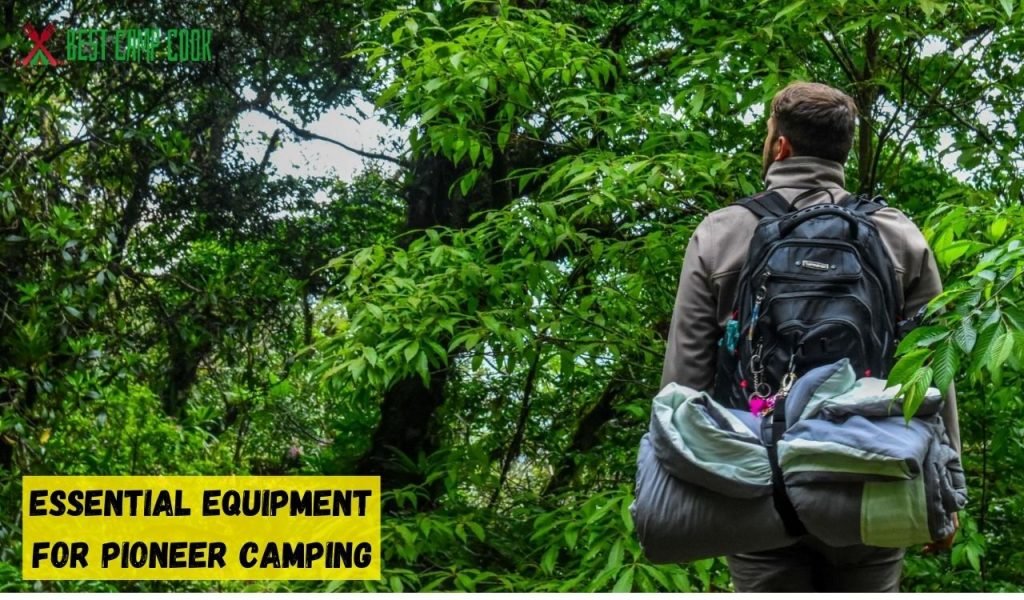
When preparing for a pioneer camping adventure, it’s crucial to have the right equipment to ensure your comfort, safety, and enjoyment. Consider the following list of essential gear:
A sturdy and reliable tent is a must-have for pioneer camping. Look for a tent designed for rugged conditions, with a waterproof rainfly and strong poles. Alternatively, you can opt for a lightweight tarp or hammock system if you prefer a more minimalist approach.
Invest in a high-quality sleeping bag suitable for the expected temperatures of your camping destination. Choose a bag with proper insulation and consider the weight and packability. Additionally, bring a sleeping pad or mattress for insulation and cushioning, ensuring a more comfortable night’s sleep.
Select a durable and comfortable backpack that can accommodate all your gear and supplies. Look for a backpack with adjustable straps, hip belt, and multiple compartments for organized storage. Consider the size based on the duration of your trip and the amount of gear you need to carry.
Pack lightweight and portable cooking equipment for preparing meals in the wilderness. This may include a camping stove or a small backpacking stove, cooking pots and pans, utensils, and a heat-resistant camping mug or bowl. Don’t forget to bring a reliable fire starter or matches for cooking over a campfire.
Ensure a safe and continuous supply of drinking water by bringing a reliable water filtration system or purifier. This can range from a simple water filter bottle to a gravity-fed filtration system or water purification tablets. It’s essential to have a means of obtaining potable water from natural sources.
Carry navigation tools to help you stay on course during your pioneer camping trip. This may include a detailed map of the area, a compass for orientation, and a GPS device or smartphone with offline maps. Familiarize yourself with the use of these tools before your trip to navigate with confidence.
Accidents and injuries can happen even in the wilderness, so always have a well-stocked first aid kit on hand. Include essentials like bandages, antiseptic ointment, pain relievers, adhesive tape, tweezers, and any necessary prescription medications. Familiarize yourself with basic first aid procedures before your trip.
Ensure you have reliable lighting options for illuminating your campsite at night. Bring a headlamp or flashlight with extra batteries to navigate in the dark. Consider ambient lighting options such as lanterns or string lights to create a cozy atmosphere around your camp.
Pack appropriate clothing layers suitable for the expected weather conditions. Include moisture-wicking and quick-drying fabrics to stay comfortable. Don’t forget to bring a waterproof jacket or poncho and sturdy, waterproof hiking boots or trail shoes to protect your feet.
Maintain cleanliness and hygiene during your pioneer camping trip with essential personal care items. This may include biodegradable soap, a toothbrush and toothpaste, hand sanitizer, toilet paper, wet wipes, and a small towel. Remember to adhere to Leave No Trace principles and properly dispose of waste.
Carry a basic repair kit with essential tools to handle any equipment or gear malfunctions. This may include a multi-tool, duct tape, nylon cord or paracord, extra tent stakes, and patch kits for tents or sleeping pads. Being prepared to fix minor issues can save you from potential disruptions.
In case of emergencies or unexpected situations, it’s wise to have an emergency communication device. This can be a satellite phone, a personal locator beacon (PLB), or a two-way radio. Familiarize yourself with the operation of these devices and have them readily accessible when needed.
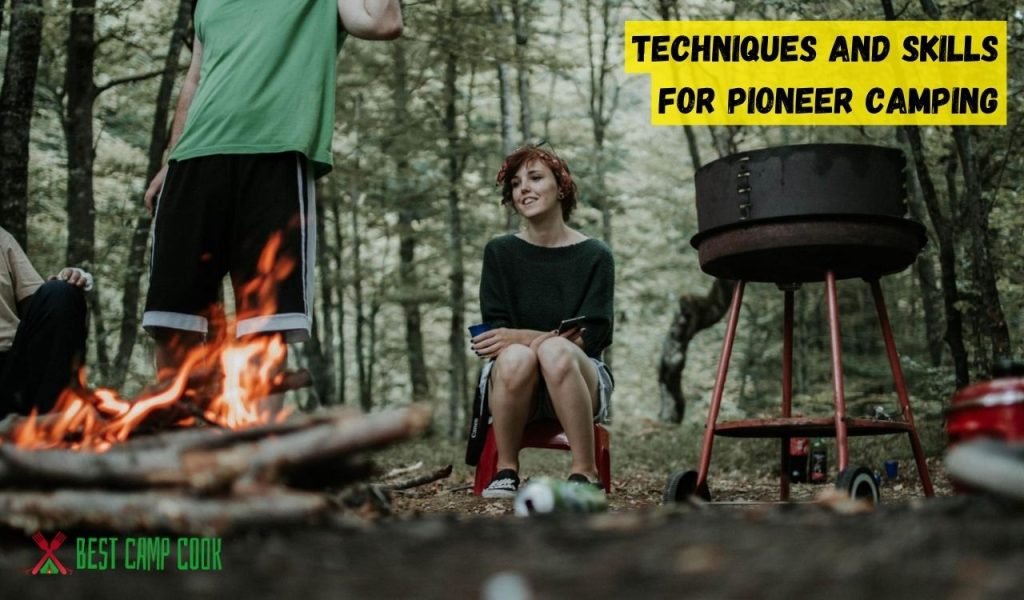
Mastering certain techniques and skills is essential for a successful and enjoyable pioneer camping experience. Here are some key techniques to consider:
Knowing how to build and maintain a fire is crucial for cooking, warmth, and signaling. Learn different fire-building techniques such as using fire starters, tinder, kindling, and larger fuel logs. Practice fire safety and always extinguish the fire completely before leaving.
Efficiently setting up your campsite ensures a comfortable and functional living space. Familiarize yourself with pitching tents, securing guylines, and creating taut and sturdy structures. Consider the placement of your tent, perfect kitchen area, and common gathering space to optimize convenience and safety.
Mastering a variety of knots is invaluable for various camping tasks. Learn essential knots like the bowline, taut-line hitch, clove hitch, and trucker’s hitch. These knots can be used for securing tarps, setting up shelters, hanging bear bags, or creating clotheslines.
Finding reliable water sources and effectively purifying water are vital skills. Learn how to identify potential water sources such as streams, rivers, or natural springs. Additionally, practice water purification techniques such as using water filters, boiling, or chemical treatments to ensure safe drinking water.
Respect for the environment is paramount in pioneer camping. Familiarize yourself with the Leave No Trace principles, which include minimizing campsite impact, properly disposing of waste, respecting wildlife, leaving natural resources undisturbed, and washing dishes in camping. Leave the wilderness as pristine as you found it to preserve its beauty for future generations.
Cooking in a pioneer camping setting requires adaptation and resourcefulness. Learn outdoor cooking techniques like using a camp stove, open fire cooking, or Dutch oven cooking. Experiment with simple yet delicious recipes that utilize readily available ingredients.
Navigating through the wilderness requires basic navigation skills. Learn how to read maps, use a compass, and understand topographic features. Practice orienteering and develop a sense of direction to confidently explore the wilderness.
Being prepared for emergencies is essential in remote environments. Learn basic first aid skills, including CPR and wilderness-specific techniques. Carry a signaling device such as a whistle or mirror and know how to use them in case of an emergency. Additionally, familiarize yourself with local wildlife and potential risks specific to the area you are exploring.
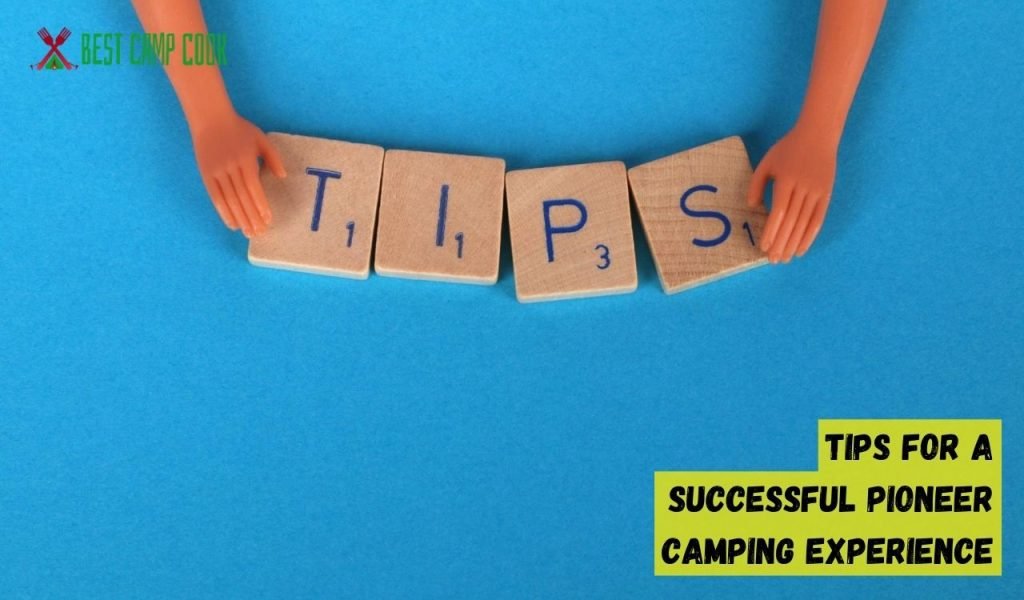
Embarking on a pioneer camping adventure can be an exciting and fulfilling experience. To make the most of your trip, consider the following tips:
Before heading out, conduct thorough research about your chosen pioneer camping destination. Familiarize yourself with the local regulations, weather conditions, terrain, and any potential hazards. Plan your itinerary, including the duration of your stay, hiking routes, and points of interest.
Pioneer camping often involves carrying your gear on your back, so it’s essential to pack light and efficiently. Make a checklist of the necessary items and prioritize multi-purpose gear. Minimize non-essential items to reduce the weight of your backpack and improve your mobility on the trail.
As a responsible pioneer camper, it’s crucial to follow Leave No Trace principles to minimize your impact on the environment. Leave the campsite as you found it, dispose of waste properly, and avoid damaging vegetation. Respect wildlife and their habitats, keeping a safe distance and refraining from feeding or disturbing them.
Maintaining proper hydration and nutrition is essential during your pioneer camping trip. Drink plenty of water and carry a sufficient supply or have access to water sources along the way. Pack lightweight, high-energy foods that are easy to prepare and provide the necessary nutrients to sustain your physical activity.
If you plan to have a campfire, ensure you understand and practice proper fire safety techniques. Check local regulations and obtain any necessary permits. Choose established fire rings or pits whenever possible, keep the fire small, and never leave it unattended. Fully extinguish the fire before leaving the area.
Pioneer camping often exposes you to varying weather conditions. Pack appropriate clothing layers to accommodate temperature changes. Bring a waterproof jacket or poncho, as well as a hat and sunscreen for sun protection. Stay informed about weather forecasts before and during your trip to adapt your plans accordingly.
Pioneer camping offers an opportunity to enhance your wilderness skills. Learn basic navigation techniques, such as reading maps and using a compass. Practice setting up and taking down your campsite efficiently. Hone your outdoor cooking skills and experiment with different meal options. The more skills you develop, the more confident and self-reliant you’ll become in the wilderness.
Pioneer camping is often done in remote and serene natural settings. Respect quiet hours to preserve the tranquility of the environment. Avoid making excessive noise that could disturb wildlife or fellow campers. Appreciate the sounds of nature and use headphones or lower the volume of any electronic devices you bring.
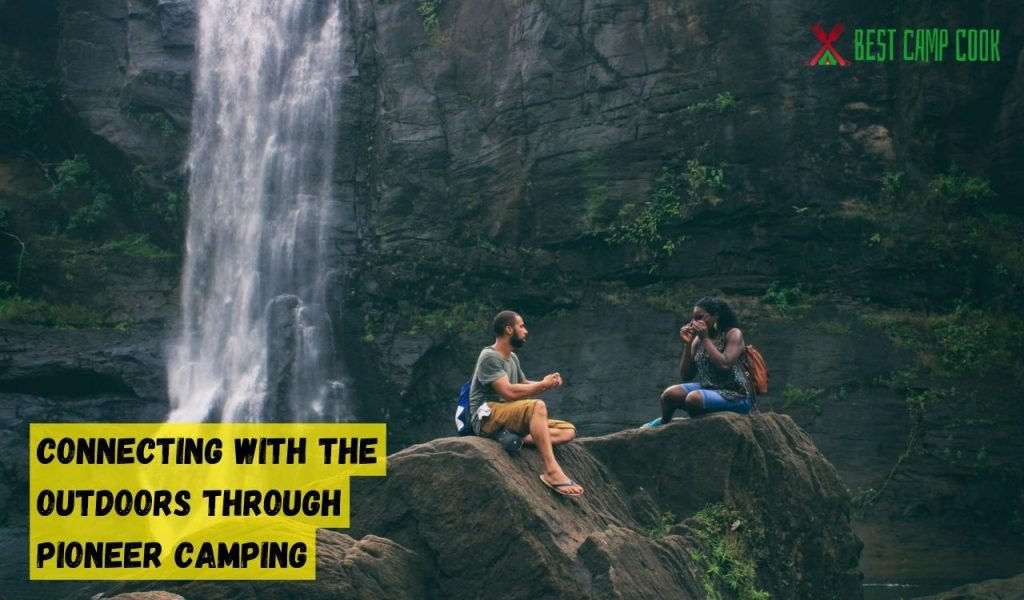
Pioneer camping provides a unique opportunity to connect with the outdoors on a deeper level. Here’s how this type of camping experience allows you to establish a stronger bond with nature:
Pioneer camping takes you away from the hustle and bustle of everyday life and immerses you in the beauty of nature. By living in the wilderness, you can fully appreciate the sights, sounds, and sensations of the natural world. It allows you to disconnect from technology and embrace a simpler, more mindful way of living.
Pioneer camping encourages self-reliance and resourcefulness. As you rely on your skills and the gear you’ve packed, you develop a sense of independence and confidence in your abilities. This sense of self-reliance extends beyond the camping experience and can positively impact other aspects of your life.
Through pioneer camping, you gain a greater understanding and appreciation for the environment. Spending time in nature heightens your awareness of its fragility and the importance of preserving it. You become more conscious of sustainable practices and may adopt environmentally-friendly habits in your daily life.
Pioneer camping allows you to disconnect from the distractions of modern life and be present in the moment. It provides an opportunity to practice mindfulness, reducing stress and promoting mental well-being. The simplicity and serenity of the wilderness can have a profound positive impact on your overall mood and mindset.
Pioneer camping often involves sharing the experience with others. Whether it’s friends, family, or fellow outdoor enthusiasts, camping together fosters stronger bonds and creates lasting memories. Spending quality time in nature promotes meaningful conversations, shared adventures, and a sense of camaraderie.
Pioneer camping provides a glimpse into the way our ancestors lived and survived in nature. By immersing yourself in a primitive camping experience, you can gain a deeper appreciation for the skills and resourcefulness required to thrive in the wilderness. This connection to our ancestral roots can be incredibly rewarding and foster a sense of connection to the past.
Pioneer camping allows you to synchronize your daily routines with the natural rhythms of the environment. Waking up with the sunrise, observing the patterns of wildlife, and retiring to your tent under a starlit sky all contribute to a heightened sense of harmony with nature. This immersion in the natural world can help reset your internal clock and foster a greater connection to the Earth.
The wilderness is a classroom in itself, offering numerous opportunities to learn from nature. As you observe the intricate ecosystems, study animal behavior, and identify various plant species, you deepen your understanding of the interconnectedness of all living things. Pioneer camping provides a platform for experiential learning and fosters a sense of curiosity and awe for the natural world.
Pioneer camping often involves physical activity, such as hiking, trekking, and carrying a backpack. Engaging in these outdoor pursuits helps improve your physical fitness and endurance. The challenges and demands of pioneer camping push your limits and allow you to discover the resilience and strength of your body.
Spending time in the wilderness through pioneer camping cultivates a sense of gratitude and humility. When faced with the vastness and beauty of nature, you realize your place in the grand scheme of things. This humbling experience promotes a sense of gratitude for the Earth’s gifts and a desire to protect and preserve them for future generations.
Pioneer camping invites you to explore and appreciate the wonders of the natural world. Witnessing breathtaking landscapes, encountering wildlife, and experiencing the magic of starry nights evoke a sense of wonder and awe. This connection to the extraordinary beauty of nature nourishes your spirit and ignites a sense of childlike curiosity.
While pioneer camping can be a rewarding experience, it’s essential to avoid common mistakes that can compromise your safety and enjoyment. Be aware of the following pitfalls:
Inadequate research and planning can lead to unexpected challenges and difficulties during your pioneer camping trip. Plan your route, understand the terrain, and prepare for potential hazards. Failing to plan adequately can result in getting lost, encountering unsafe conditions, or being unprepared for the environment.
Carrying excessive gear and supplies can weigh you down and make the journey more strenuous. Be mindful of packing only the essentials and prioritizing lightweight, multi-purpose items. Remember, the goal is to have the necessary equipment without burdening yourself with unnecessary weight.
Failing to develop basic navigation skills can lead to getting lost or disoriented. Learn how to read maps, use a compass, and understand landmarks. It’s important to have the knowledge and tools to navigate your surroundings and find your way back to camp or civilization if needed.
Safety should always be a top priority during pioneer camping. Neglecting safety precautions such as not properly extinguishing campfires, ignoring wildlife warnings, or disregarding weather forecasts can result in accidents or injuries. Always follow safety guidelines and be aware of your surroundings.
Pioneer camping is about enjoying the wilderness while minimizing your impact on the environment. Failing to adhere to Leave No Trace principles can harm ecosystems, disturb wildlife, and degrade natural beauty. Practice responsible camping by leaving your campsite clean and respecting the natural surroundings.
Weather conditions in the wilderness can change rapidly and significantly. Failing to prepare for changing weather, such as not bringing appropriate clothing or not seeking shelter during storms, can put you at risk. Stay informed about weather forecasts and be prepared to adapt your plans accordingly.
Choosing an inappropriate campsite can lead to discomfort or safety hazards. Avoid setting up camp in low-lying areas prone to flooding, under dead or unstable trees, or near animal habitats. Select a site that is level, offers natural protection from the elements, and is at a safe distance from potential hazards.
Mishandling fires is a significant mistake in pioneer camping. Inadequate fire management can lead to accidents, forest fires, and damage to the natural environment. Mistakes include starting fires in unsafe areas, not properly extinguishing fires, or using excessive firewood, leading to resource depletion. Familiarize yourself with fire regulations, practice responsible fire management, and ensure you have the necessary tools to control and extinguish fires.
Pioneer camping, as a beloved outdoor activity, continues to evolve with advancements in technology and a growing focus on sustainability. The future of pioneer camping holds exciting prospects, combining innovation and sustainability to enhance the camping experience while preserving the natural environment. Here are some key aspects shaping the future of pioneer camping:
As technology continues to advance, it plays a significant role in improving the convenience and safety of pioneer camping. Innovations such as lightweight and durable camping gear, advanced navigation tools, and portable power sources have already made their way into the camping market.
These advancements allow campers to carry lighter loads, navigate unfamiliar terrains more efficiently, and stay connected with emergency services or loved ones in case of emergencies. Furthermore, wearable technology and smart devices are emerging as valuable companions for outdoor enthusiasts.
GPS-enabled watches, weather-resistant smartphones, and compact solar chargers are just a few examples of how technology is revolutionizing the camping experience. These devices provide valuable information, enhance safety, and enable campers to capture and share their adventures more easily.
With a growing awareness of environmental conservation, the future of pioneer camping embraces sustainable practices. Campers are increasingly conscious of their impact on the environment and are actively seeking ways to minimize it.
Leave No Trace principles, which emphasize responsible outdoor ethics, are becoming even more important. Innovations in sustainable camping gear are gaining traction.
Manufacturers are developing eco-friendly materials, reducing waste during production, and designing products that are durable and repairable. Campers are also encouraged to prioritize reusable and recyclable items, minimize single-use plastics, and practice proper waste management by carrying out what they bring in.
In the future, pioneer camping will likely rely more on eco-friendly energy sources. Solar-powered equipment, such as solar panels for charging devices or solar lanterns for lighting, will become more prevalent, reducing the reliance on disposable batteries or fuel-powered alternatives. Additionally, advancements in portable wind turbines and efficient biomass stoves offer alternatives for generating energy while minimizing environmental impact.
As the desire for simplicity and minimalism grows, pioneer campers are opting for gear that serves multiple purposes. Multifunctional camping equipment, such as tents with built-in storage compartments, sleeping bags that double as quilts, or cooking utensils that can perform multiple functions, enable campers to pack lighter while still meeting their essential needs.
The future of pioneer camping aims to make the activity more accessible and inclusive to individuals of diverse backgrounds and abilities. Campgrounds and outdoor organizations are working towards creating infrastructure and facilities that accommodate individuals with disabilities. Additionally, initiatives are underway to provide education and resources to make camping more welcoming to people from different cultural backgrounds and those with limited outdoor experience.
Pioneer camping continues to be a cherished activity for outdoor enthusiasts, offering a unique opportunity to connect with nature, build resilience, and create lasting memories. As we look to the future, innovation and sustainability are set to shape the evolution of pioneer camping.
From incorporating advanced technology for convenience and safety to embracing eco-friendly practices and fostering inclusivity, the future of pioneer camping holds immense potential. By prioritizing sustainable practices, adhering to Leave No Trace principles, and embracing the advancements in camping gear and technology, campers can ensure a positive and responsible outdoor experience.
As we venture into the great outdoors, let us strive to preserve the beauty of nature for future generations while enjoying the wonders and adventures that pioneer camping has to offer.
A pioneer camp is a type of summer camp that focuses on outdoor activities, adventure, and skill-building. It provides an opportunity for children and teenagers to learn new things, develop self-reliance, and foster teamwork in a natural setting.
Pioneer camps are typically designed for children and teenagers between the ages of 8 and 17. However, some camps may have specific age ranges or programs tailored for different age groups.
Pioneer camps offer a wide range of activities, including hiking, camping, canoeing, kayaking, swimming, team sports, arts and crafts, nature exploration, and outdoor skills development. The specific activities can vary depending on the camp and its location.
Pioneer camps prioritize the safety of participants. They have trained staff members who ensure the well-being of campers, follow safety protocols, and provide supervision during activities. Camps also conduct risk assessments and implement appropriate safety measures to minimize potential hazards.
The duration of pioneer camps can vary. Some camps offer week-long sessions, while others may have programs that last for multiple weeks. There are also day camps where campers attend activities during the day and return home in the evenings.
Pioneer camps provide numerous benefits to participants. They offer opportunities for personal growth, the development of outdoor skills, building self-confidence, fostering social connections, and creating lasting memories. Campers often gain independence, resilience, and a deeper appreciation for nature.
To find pioneer camps in your area, you can search online using keywords such as “pioneer camp,” “summer camp,” and your location. You can also reach out to local community centers, schools, or youth organizations for recommendations.
The specific packing list can vary depending on the camp’s guidelines, but generally, campers should bring essentials such as clothing suitable for outdoor activities, comfortable shoes, toiletries, sunscreen, a water bottle, insect repellent, sleeping bag, and any specific items mentioned in the camp’s packing list.
The cost of attending a pioneer camp can vary depending on factors such as the camp’s location, duration, amenities, and activities offered. It is advisable to check the camp’s website or contact them directly to get information about the fees and any available financial assistance or scholarships.
Each camp has its own policies regarding parental visits. Some camps may have designated visiting days or times, while others may have restrictions on visitation to maintain the campers’ focus and ensure a smooth camp experience. It’s best to check with the camp administration for their specific policies.